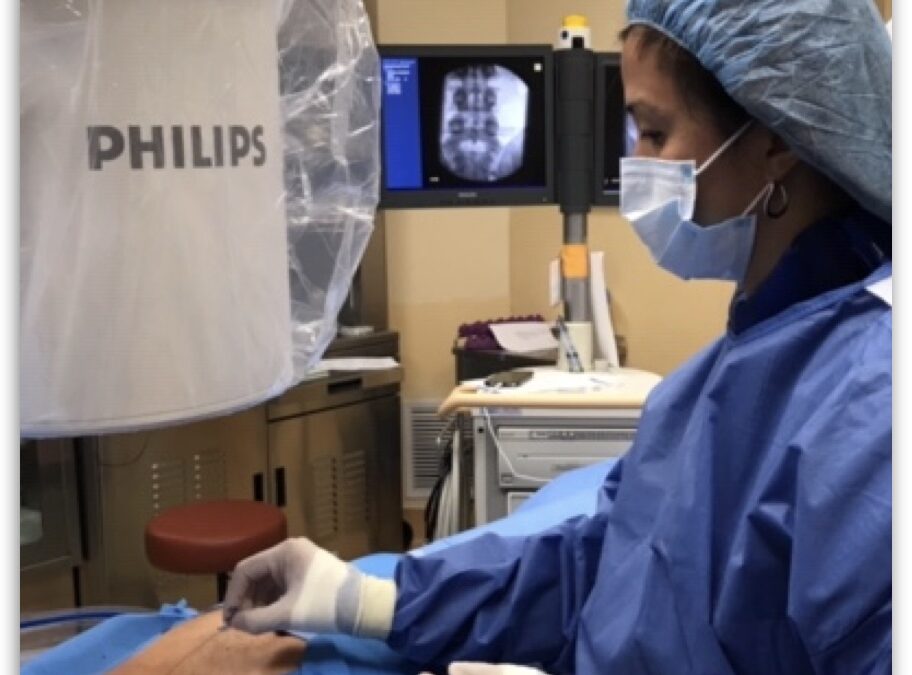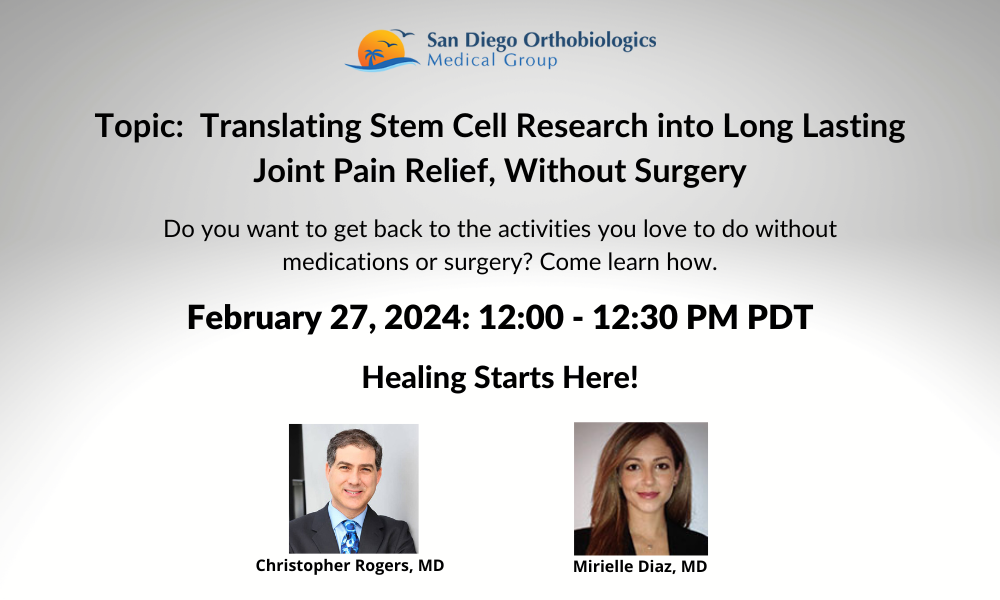
Apr 19, 2024
Join Dr. Choll Kim from Excel Spine and Dr. Chris Rogers from San Diego Orthobiologics Medical Group as they chat golf and back pain. Chances are, your back isn’t messing up your swing – it’s golf that’s messing with your back.
Golfing strains your back in unnatural ways. A golf swing using all the inner core muscles, compresses the spine disc and joints. The discs, joints, and ligaments in your back are meant to give you stable motion, but if the motion is disrupted, pain occurs.
Watch the full video HERE

Apr 5, 2024
Join Dr. Evangelista to learn more about Platelet Rich Plasma in a free webinar. For patients seeking treatment with Platelet Rich Plasma (PRP), Dr. Evangelista will discuss:
Time: 12pm PDT
When: Tuesday, April 9, 2024
Dr. Evangelista has a special interest and extensive training in Regenerative Medicine (using the body’s own cells to stimulate the healing and repair of injured tissues). He believes these treatments have tremendous potential for treating a variety of orthopedic and pain conditions.
Click Here to Register

Mar 6, 2024
Congratulations to Dr. Ambach who is one of the investigators in this landmark study and co-author of the paper. This is a multi-center randomized placebo-controlled clinical trial using platelet rich plasma (PRP) and Bone marrow derived cells to treat degenerative disc disease in the lumbar spine. These cells were derived from the patient’s own blood and bone marrow. The study was able to show safety and superiority of PRP and Bone marrow derived cells over placebo in treating low back pain due to degenerative disc.
Read the full paper here: https://pubmed.ncbi.nlm.nih.gov/38285032/
SEE MORE: The Safety and Effectiveness of Orthobiologic Injections for Discogenic Chronic Low Back Pain

Feb 22, 2024
Knee pain can be debilitating, affecting an individual’s mobility and quality of life. Whether it’s caused by injury, arthritis, or other underlying conditions, finding an effective treatment for knee pain is crucial. One innovative solution gaining popularity is MFAT (Micro-fragmented Adipose Tissue), a minimally invasive procedure that uses a patient’s own fat tissue to promote healing and relieve knee pain. In this article, we will explore the causes of knee pain, introduce MFAT as a treatment option, delve into how MFAT works to relieve knee pain, discuss the benefits of this procedure, and provide an overview of the MFAT procedure for knee pain. If you’re suffering from knee pain and seeking an effective solution, read on to discover if MFAT is the right choice for you.
Understanding Knee Pain and Its Causes
Before diving into MFAT as a treatment option, it’s essential to understand the causes of knee pain. Knee pain can arise from a variety of factors, including injuries, overuse, or underlying medical conditions such as arthritis. Injuries like ligament tears, meniscus tears, or fractures can lead to acute knee pain that requires immediate attention. On the other hand, chronic knee pain caused by arthritis or other degenerative conditions can develop gradually over time and worsen with age. Identifying the root cause of knee pain is crucial in determining the appropriate treatment approach.
Introduction to MFAT Treatment for Knee Pain
MFAT is a cutting-edge regenerative medicine treatment that offers a promising solution for individuals suffering from knee pain. This innovative procedure utilizes the patient’s own adipose tissue, commonly known as fat, to promote healing and alleviate pain. Unlike traditional treatments that focus on managing symptoms, MFAT targets the underlying cause of knee pain by harnessing the regenerative potential of fat tissue. By introducing a concentrated dose of adipose-derived cells into the affected knee joint, MFAT stimulates the body’s natural healing process and reduces inflammation, resulting in pain relief and improved function.
How Does MFAT Work to Relieve Knee Pain?
MFAT works by harnessing the therapeutic properties of adipose tissue to promote healing and alleviate knee pain. The procedure begins with a minor lipoaspiration technique, where a small amount of fat tissue is harvested from the donor site (such as the abdomen or buttocks) using a specialized cannula. The harvested fat tissue is then processed using innovative technology, which gently cleanses and concentrates the adipose-derived cells while preserving their regenerative properties. Once processed, the concentrated adipose-derived cells, along with their surrounding extracellular matrix, are injected into the affected knee joint. These cells release growth factors and anti-inflammatory substances, stimulating tissue repair, reducing inflammation, and ultimately relieving knee pain.
Benefits of MFAT for Knee Pain Relief
MFAT offers several advantages over traditional knee pain treatments, making it an appealing option for individuals seeking long-term relief. Firstly, MFAT utilizes the patient’s own natural fat tissue, reducing the risk of adverse reactions or rejection. Since the adipose-derived cells used in the procedure come from the patient’s own body, there is no need for foreign substances or synthetic materials. Additionally, MFAT is a minimally invasive procedure that can be performed in an outpatient setting, minimizing the risks associated with more invasive surgical interventions. The recovery time is shorter compared to traditional surgery, allowing patients to return to their daily activities sooner.
MFAT Procedure for Knee Pain
The MFAT procedure for knee pain is a relatively simple and straightforward process. It begins with a thorough consultation with a qualified physician who specializes in regenerative medicine. During the consultation, the physician will assess the patient’s knee pain, review medical history, perform a physical examination, and determine if MFAT is a suitable treatment option. If deemed appropriate, the lipoaspiration procedure will be scheduled. On the day of the procedure, the patient will undergo a local anesthetic to numb the donor site. A small incision is made, and the fat tissue is gently suctioned out using a specialized cannula. The harvested fat tissue is then processed, and the concentrated adipose-derived cells are injected into the affected knee joint using a thin needle under ultrasound guidance. The entire procedure typically takes less than two hours, with minimal discomfort and downtime for the patient.
Is MFAT the Right Solution for Your Knee Pain?
Knee pain can significantly impact an individual’s quality of life, limiting mobility and causing discomfort. If you are seeking an effective solution for knee pain, MFAT may be the answer you’ve been looking for. This innovative regenerative medicine treatment offers a minimally invasive approach that targets the underlying cause of knee pain, promoting healing and reducing inflammation. With its numerous benefits, including the use of the patient’s own adipose tissue and shorter recovery time, MFAT provides an appealing alternative to traditional knee pain treatments. However, as with any medical procedure, it’s essential to consult with a physician to determine if MFAT is the right solution for your specific condition. Take the first step towards relieving your knee pain and regain your mobility by scheduling a consultation with a regenerative medicine specialist today.
Schedule a consultation with a regenerative medicine specialist at San Diego Orthobiologics Medical Group today to explore if MFAT is the right solution for your knee pain. Don’t let knee pain hold you back any longer.

Feb 20, 2024
Join Dr. Rogers and Dr. Diaz as they discuss the exciting results of their latest stem cell research and experience with FDA-compliant cell therapies that are available.
Time: 12pm PDT
When: February 27, 2024
Dr. Rogers is one of the world’s leading experts in orthopedic regenerative medicine and developed a new technique for treating tendon injuries, osteoarthritis, and disc degeneration.
Dr. Diaz specializes in comprehensive non-surgical treatments for musculoskeletal and sports-related injuries. She is constantly educating herself so she can better serve her patients using state-of-the-art therapies and advanced treatments in her field.
Click HERE to Register

Feb 15, 2024
Last week, San Diego Orthobiologics Medical Group physicians, Dr. Chris Rogers and Dr. Mary Ambach were featured speakers at the annual Interventional Orthobiologics Foundation (IOF) conference.
The Interventional Orthobiologics Foundation is a leader in the field of Regenerative Medicine, having trained more than 1000 physicians.
Each year, the those the IOF MAX Experience where more than 250 orthopedic physicians from around the world come to learn the latest in cell-based therapies such as Platelet-Rich Plasma (PRP) and stem cell therapy.
This year, Dr. Rogers and Dr. Ambach were honored to be selected to both moderate the event and present the keynote address.
To view their presentations, you can visit the SDOMG YouTube Channel.













